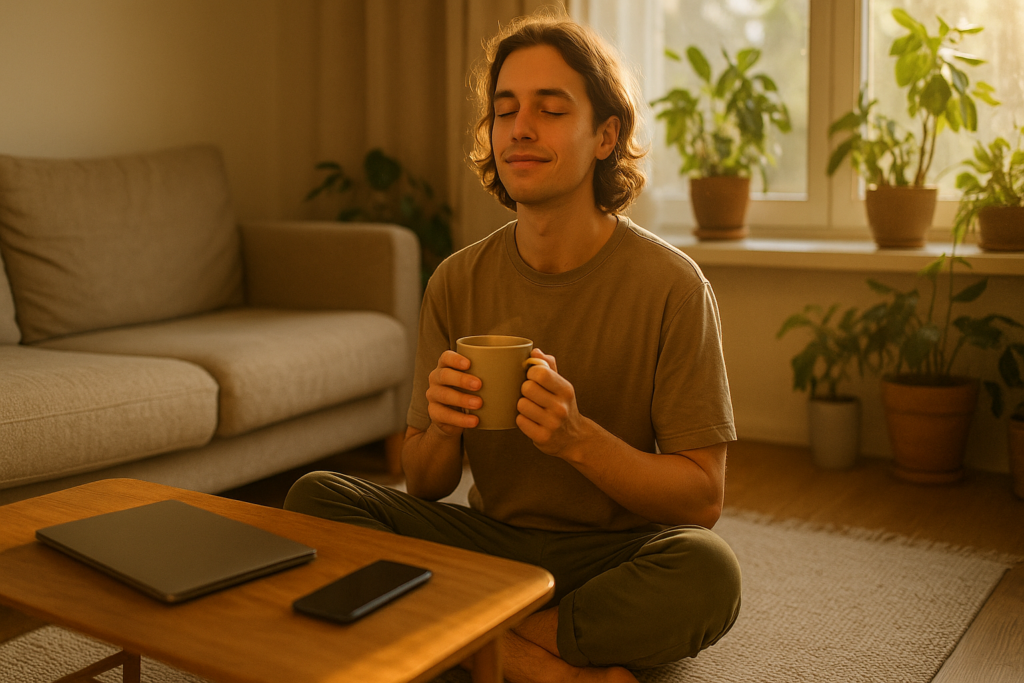We live in a world that glorifies busyness.
We chase more productivity, more notifications, more goals, more content, more engagement—thinking that if we just get more done, we’ll feel better. But ironically, the more we chase, the more stressed, distracted, and disconnected we become.
Peace isn’t found in doing more. It’s found in letting go.
And after years of practicing mindfulness and studying both psychology and Buddhist philosophy, I’ve learned that one of the fastest ways to feel lighter and more grounded is to cut out the habits that quietly drain your time and energy.
Here are 8 time-wasting habits to let go of if you want more peace in your life.
1. Constantly checking your phone for no reason
Let’s be real: most of us aren’t checking our phones because we have something urgent to respond to. We’re checking because we’re bored, anxious, or avoiding something.
The average person checks their phone over 90 times a day. That’s once every 10 to 12 minutes. Each time, you fragment your attention and disrupt your inner calm.
Instead, try creating phone-free pockets in your day—like the first hour after waking up, meal times, or your final hour before bed.
You don’t need to quit your phone. You just need to stop letting it control you.
2. Overthinking conversations and social interactions
If you’re someone who replays conversations in your head—“Did I sound weird?”, “Should I have said that differently?”, “What did they mean by that look?”—you’re not alone.
But overanalyzing social interactions rarely gives us clarity. It gives us stress, self-doubt, and sleepless nights.
Letting go of this habit means trusting your intentions. If you spoke with honesty and respect, that’s enough. You don’t need to edit and re-edit your words in your head long after the moment has passed.
Peace comes when you give yourself permission to move on.
3. Consuming content that leaves you feeling worse
This was a big one for me.
There was a time when I’d spend hours scrolling through news, social media, or YouTube rabbit holes—telling myself I was “relaxing.” But by the end, I felt more anxious, envious, or just flat-out numb.
Eventually, I had to ask: is this content nourishing me or draining me?
When you stop consuming content that agitates your nervous system, you create space for presence, clarity, and yes—peace.
4. Trying to fix everyone’s problems
If you’re a naturally caring or empathetic person, you’ve probably fallen into this trap: thinking it’s your job to fix everyone.
But here’s the truth: carrying everyone else’s emotional weight isn’t noble. It’s exhausting.
Trying to solve your friend’s relationship drama, your sibling’s career indecision, or your co-worker’s burnout might give you a temporary sense of purpose—but it robs you of peace. And in most cases, it doesn’t actually help them long-term.
You can still love and support people without taking on their problems as your own.
5. Filling every free moment with productivity
This one hit me hard when I became an entrepreneur.
There’s this subtle pressure to fill every free moment with something “useful”—answering emails, listening to podcasts, planning your next move. Rest starts to feel like a luxury you can’t afford.
But here’s what I’ve learned: true productivity is not about doing more. It’s about doing what matters, with clarity and focus.
When you give yourself space to breathe, reflect, or just be, you come back to your work with sharper focus and more creativity.
Don’t let “always being busy” become your personality. Let it go—and notice how much calmer your life becomes.
6. Comparing your journey to others
Few habits rob us of peace more than comparison.
Scrolling through someone’s highlight reel and wondering why you’re not as far along… seeing peers achieve things you’re still working toward… watching others appear effortlessly happy while you’re struggling behind the scenes.
But the truth is: nobody posts their full reality. You don’t see the messy middle. You don’t see the doubt, fear, or the years of quiet work.
When you compare your life to someone else’s, you abandon your own path.
The antidote? Gratitude and presence.
Focus on how far you’ve come, not how far you think you should be. Your journey is valid, even if it looks different.
7. Dwelling on past mistakes
If peace lives in the present, then guilt lives in the past.
And many of us carry guilt like a backpack full of bricks—replaying mistakes, regretting choices, wishing we’d done things differently.
But here’s the hard truth: the past can’t be changed. It can only be accepted, learned from, and let go.
This doesn’t mean denying what happened. It means choosing to no longer let it define you.
You are allowed to grow. You are allowed to change. You are allowed to forgive yourself.
Letting go of past mistakes is one of the kindest things you can do for your future self.
8. Saying “yes” when you mean “no”
This might be the most overlooked peace-killer of all.
Every time you say “yes” to something you don’t want to do—out of guilt, fear of conflict, or the desire to be liked—you abandon a part of yourself.
You say “yes” to the event you’re dreading. You say “yes” to the favor that drains you. You say “yes” to being available when you desperately need rest.
But every unnecessary “yes” is a “no” to your own needs.
Learning to say “no” kindly—but firmly—is a life-changing skill. It doesn’t make you rude. It makes you self-respecting.
Peace thrives when your boundaries are clear.
Final thoughts: Create space for what truly matters
Peace isn’t something you stumble into—it’s something you create.
And often, the most powerful way to cultivate peace isn’t by adding more meditation apps or self-help routines. It’s by subtracting what no longer serves you.
When you stop wasting time on habits that drain your energy, your natural state of calm starts to return. You feel more grounded, more focused, and more yourself.
Let go of what’s heavy. Make space for what matters.
Your peace is waiting.
















